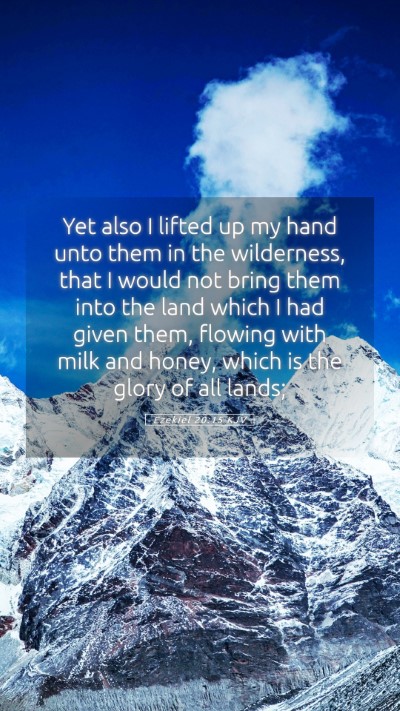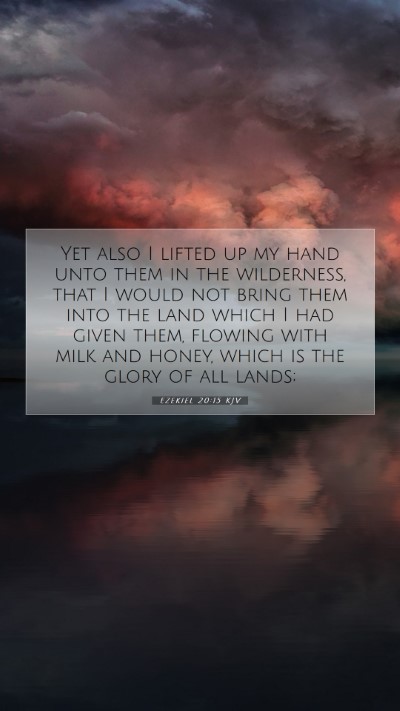Ezekiel 20:15 - Bible Verse Explanation
Bible Verse: Ezekiel 20:15 - "Yet also I lifted up my hand unto them in the wilderness, that I would not bring them into the land which I had given them, flowing with milk and honey, which is the glory of all lands."
The verse holds profound significance within the context of the Book of Ezekiel, as it deals with God’s relationship with the people of Israel and highlights themes of disobedience, judgment, and divine sovereignty.
Understanding the Context
The historical context of this passage relates to the period when the Israelites were wandering in the wilderness after their liberation from Egyptian bondage. Despite their miraculous deliverance, the people frequently turned to idolatry and disobedience against God's commandments. The phrase "lifted up my hand" signifies a solemn oath God made to the Israelites regarding their fate in the Promised Land.
Bible Verse Commentary
This commentary synthesizes insights from notable biblical commentaries to provide a comprehensive understanding of Ezekiel 20:15:
-
Matthew Henry:
Henry emphasizes that God's decision to deny the Israelites entry into the land of promise was not arbitrary but a direct result of their persistent rebellion. He notes that the "land flowing with milk and honey" was meant as a reward for their faithfulness, which they continually failed to exhibit. God's lifting of His hand serves as a poignant reminder of His holiness and the serious consequences of Israel's unfaithfulness.
-
Albert Barnes:
Barnes elaborates on the concept of "the glory of all lands," indicating that the land of Canaan represented not just physical nourishment but also spiritual abundance and closeness to God. He identifies this moment as a critical juncture, where God's mercy and justice converge, reflecting His desire for His people to remain steadfast. Barnes points out the shocking nature of their rejection of such a blessing, illustrating God's disappointment over their choices.
-
Adam Clarke:
Clarke provides an in-depth reflection on the consequences of the Israelites' actions. He remarks that God's decision was made in response to their repeated ingratitude and rebellion, underscoring the gravity of their actions. Clarke also discusses the metaphorical implications of "milk and honey," illustrating the richness of life that accompanies obedience to God's commandments.
Scripture Analysis
This verse emphasizes the dual nature of God's character, demonstrating both His readiness to bless and His commitment to His righteous standards. The disobedience of the Israelites serves as a lesson that resonates throughout Scripture, reminding readers of the importance of remaining faithful to God’s ways.
Application of the Verse
For those seeking to apply the teachings of Ezekiel 20:15 in their daily lives, consider the following:
- Reflect on the importance of obedience to God in your life.
- Analyze areas where you might be leading a life that veers from His commandments.
- Understand the significance of spiritual blessings that come from a life dedicated to God.
Cross References
Additional Bible verses related to Ezekiel 20:15 include:
- Numbers 14:23 - God's determination that those who rebel would not see the Promised Land.
- Deuteronomy 1:34-35 - God's anger toward the Israelites for their lack of faith.
- Hebrews 3:16-19 - A warning regarding the consequences of disbelief.
Conclusion
In summary, Ezekiel 20:15 serves as a powerful reminder of the significance of faithfulness and the dire consequences of rebellion against God's promises. Through careful analysis and reflection, believers can grasp the essential lessons contained within this verse and apply them to their spiritual journeys.
Utilizing this understanding in Bible study groups, online Bible study, and when employing various Bible study tools can enrich one's experience and enhance their Bible verse understanding.


